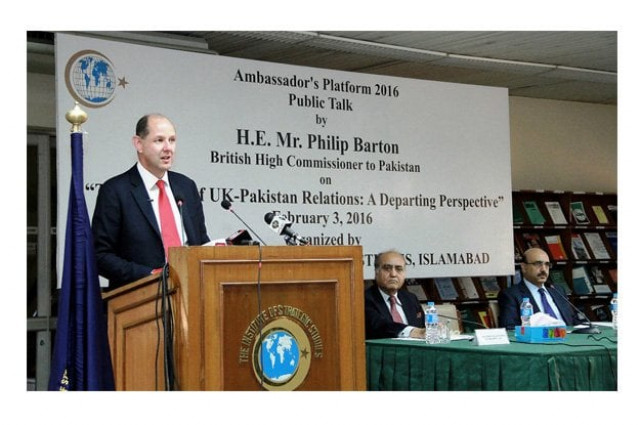Farewell speech: Pakistan is on a positive trajectory, says Barton
Outgoing UK envoy also acknowledges role of law enforcement in fighting terrorism

Outgoing British High Commissioner Philip Barton addressing the seminar. PHOTO: NNI
In a farewell speech at a seminar titled ‘The Future of UK-Pakistan Relations: A Departing Perspective’ organised by Institute of Strategic Studies Islamabad (ISSI) on Wednesday, he said, “I salute the bravery of the Pakistan military and their civilian counterparts in the police and other law enforcement agencies as they carry out the very difficult task of tackling terrorism across the country.”

“I will leave Pakistan next week at the end of my tenure as high commissioner after my two years here, but I am more optimistic than ever about the future of the country, and I believe that the country is now on a positive trajectory in four crucial areas including democracy, security, economy and regional relationships,” Barton said, adding that he first time visited the country over 20 years ago.
“We are of course linked by history, and I am very confident about the future relationship between the UK and Pakistan,” the High Commissioner said and maintained that he visited the Regimental Museum of the Punjab Regiment – which was his grandfather’s regiment - in Mardan and to be shown three documents that he had signed in the 1920s.
“But it is the people-to-people links that represent the present and the future. That’s why the partnership between the UK and Pakistan is long term.”
He outlined the positive role the UK had in Pakistan in the past and the partnership is likely to continue in the future.
He said around 1.3 million Pakistanis who have had microfinance loans through UK Aid and the work of the Department for International Development and UK helped 270,000 women to get CNIC cards supporting their citizenship rights. He said 5.2 million of the poorest families in Pakistan were being supported by the Benazir Income Support Programme, which is partly-funded by the UK. This programme is also providing incentives to over 1 million children to attend and stay in school, through its conditional education transfers.
He said 6.3 million Pakistani primary school children had benefited from direct UK support and the British Council will train 1 million teachers of English by 2018, to help improve the way English is taught in schools maintaining that every year, the British Council enabled 220,000 people to take nearly half a million UK examinations here in Pakistan.
“We have helped 118 Pakistani universities develop partnerships with over 90 universities in the UK, we have the Chevening scholarship programme for people pursuing fully-funded masters’ degrees at top UK universities…and there are some 1,300 Pakistani Chevening alumni now,” he said.
The High Commissioner also argued that people in Pakistan now have more space to think about the longer term future, including challenges around demography, the environment and the economy.
Published in The Express Tribune, February 4th, 2016.



















COMMENTS
Comments are moderated and generally will be posted if they are on-topic and not abusive.
For more information, please see our Comments FAQ